If demand for your products spikes during the holidays, you have an opportunity to drive revenue with easy-to-implement holiday SEO methods.
The sooner you start planning your holiday season SEO strategy and publishing content, the more holiday traffic you will get from potential customers using search engines to find the perfect gift for their loved ones.
The holiday SEO strategy planning process involves thoughtful keyword research, creating optimized content for the season, and linking your holiday content properly.
This article describes each step of the holiday SEO planning process in detail.Keep reading to learn how you can craft and implement the best seasonal SEO strategy for your business
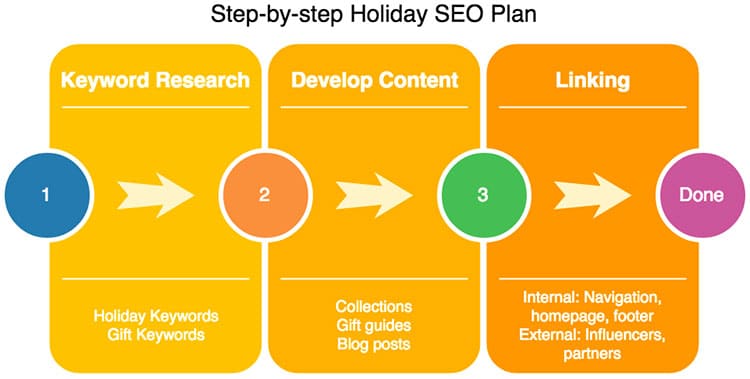
Start Planning Your Holiday SEO Strategy Early
September is the perfect time to plan and publish your holiday content. Google Shopping Holiday Forecasts report that, for many retailers, holiday-related traffic starts coming in as early as October. You want to make sure you’re ahead of the game once that happens.
Keyword Research for Seasonal Terms
Keyword research is an important part of the holiday season SEO process that will help you discover the holiday and gift keywords that your customers use during the season.
Start your holiday season keyword research with some simple questions: Do people give your products as a gifts? If so, who is the likely recipient? What specific holiday occasion do people use your products for?
For example, if you sell holiday candles you know that they are often used as part of a holiday dinner table setting or displayed on a mantel. So, you could target keywords like “christmas dinner table setting” and “holiday mantel decorations”.
A watch maker could focus on keywords that include the recipient of the gift. For example, “groomsmen gifts”, “watch gift for dad” and “watch gift set for a couple”.
Use Google’s Keyword Planner and the tool keyword.io to build out your target keywords list. The highest value keywords are relevant to your products, have high search volume and low competition.
Keep in mind that there is a difference between holiday keywords and gift keywords:
- Holiday keywords target shoppers who are looking for an item for a specific holiday – e.g. “christmas gift for my boyfriend” and “holiday cards”.
- Gift keywords target shoppers searching by recipient or non-holiday occasion – For example, “gift for a teacher” and “groomsmen gifts”. Gift keywords can drive valuable traffic all year.
It’s important that you target both holiday and gift keywords.
You will find the best keywords by drilling down to find the most relevant search terms for your products. For example, a jewelry brand could target “jewelry gift for new mom” and a toy brand might target “gift ideas for toddlers”.
Don’t forget to look into keywords for all religious and cultural holidays this season – e.g. “Hanukkah gifts” and “Kwanzaa gifts”. They can drive meaningful traffic to your e-commerce site. The table below illustrates the search volume for many Christmas, Hanukkah, and Kwanzaa keywords. Although the Christmas-related keywords have much more traffic, they are also much more competitive. Consider targeting searchers celebrating multiple holidays to stay inclusive, while boosting your organic traffic.
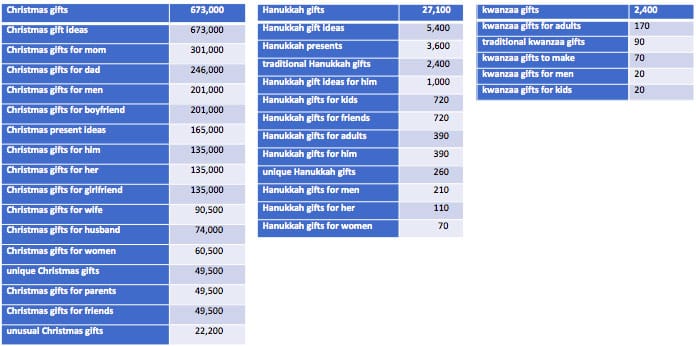
How to Evaluate the Competition for a Holiday Keyword
Some keywords are so competitive that you have little chance of ranking on the first page of the search engine results. It is best to avoid optimizing content for these keywords and focus your holiday season SEO strategy on more attainable keyword rankings.
To evaluate the competition for a keyword, simply type the keyword into Google and see which websites rank in the top 3 positions. In the example below for the keyword “christmas gifts” you will see some stiff competition. These competitors will be tough to outrank because they are each well-established websites and their page titles include the keyword phrase “christmas gifts”. These titles are well-optimized for this keyword.
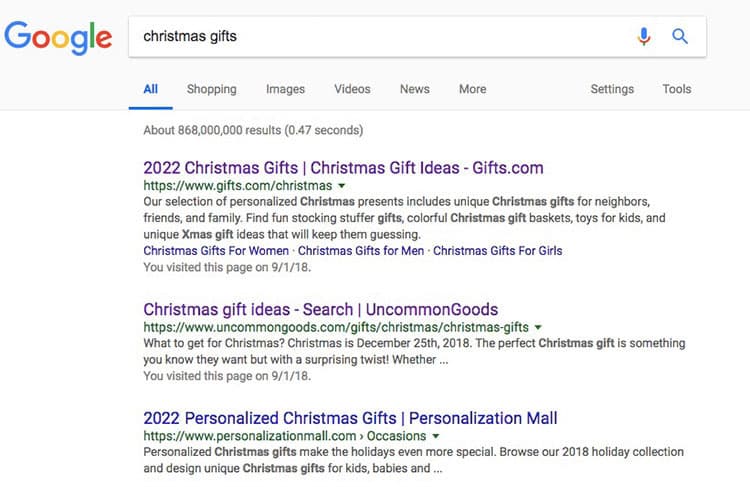
For an example of a keyword with less competition, look up “scented yoga candles”. You will see that the titles of the pages that appear in the top 3 positions do not specifically include “scented yoga candles” so they are poorly optimized for this keyword.
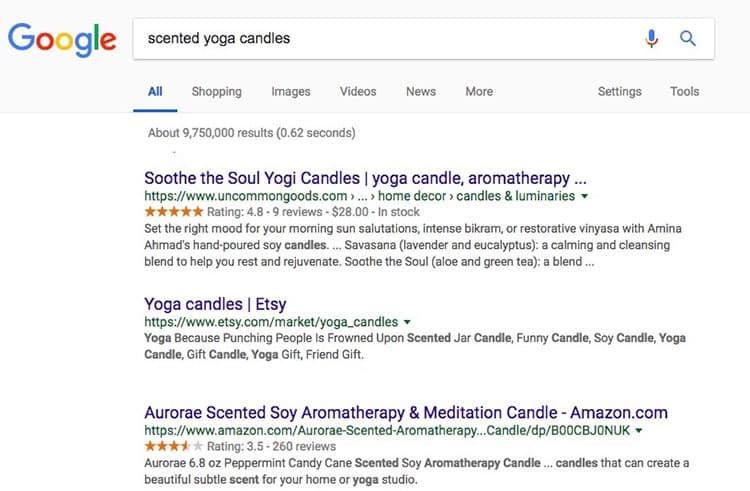
Instead of targeting a super competitive keyword like “christmas gifts”, target less competitive variations like “unusual christmas gifts” , “christmas gifts for mom” and “christmas gifts for husband”.
Develop Holiday-Related Content
Choose the best keywords based on search volume and competition. Then, start planning content for each keyword.
Creating content can be time-consuming, but it will give your holiday e-commerce SEO campaign a major boost. That is why we recommend starting by creating collections of existing products that target high value keywords.
For example, an online toy retailer could create a new collection titled “holiday gifts for toddlers” or an online candle seller could create a collection of products titled “meditation candle gift sets”. Creating a new collection typically requires choosing products on your site and writing a brief description.
Consider the search intent of your desired audience and create gift guides to attract searchers looking for “gift ideas” – i.e. target keywords like “christmas gift ideas” and “gift ideas for recent grad”.
Finally, writing articles, reviews and comparison guides that target your high value keywords will help you rank. Create an individual blog post for each keyword and include the keyword in the title for each post.
Important: Do not remove your holiday content from your website after the season ends. During the holiday season you will generate some links and authority for your holiday pages that you can leverage next year, if you keep them live on your site.
Linking Your Holiday Content
Finally, make sure your holiday content is properly linked (internally and externally).
Internal links for your holiday content will help users find it from other pages on your site as well as increase its search engine authority to help it rank.
During the holiday season, we recommend linking your most important pages (e.g. your black friday page) in your navigation, footer and somewhere in your homepage. Then, when the season is over keep the page live but remove the most prominent links. Be sure to leave at least one link to each holiday page to avoid orphaning the page.
External links are harder to get but can have a huge impact on the rankings for your holiday content. Every time a website links to your holiday content search engines consider this an endorsement of the content and give it better rankings.
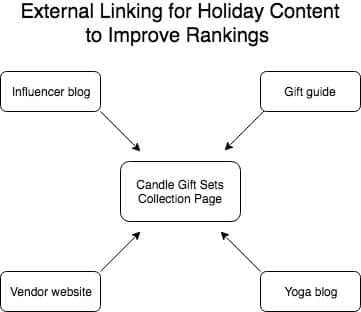
Before you write a new piece of holiday content, think about who would be interested in linking to it for their visitors to check out. Make a list of blogs, partners, or vendors who may be interested in linking to your content from their websites and reach out to them. This will signal to search engines that your site is trustworthy and they will be more likely to show your content on relevant results pages.
Is Seasonal SEO Important?
Without doing seasonal SEO during the holidays, your website will not come up for holiday-related terms on organic search, which is a huge missed opportunity considering the traffic potential that these keywords carry.
Creating and following a holiday season SEO strategy is not as complicated as it sounds. Begin early, do proper keyword research, and create linkable content that searchers want to see. It’ll take some dedication and creativity, but these steps are sure to increase organic traffic to your site this holiday season!
If you’re looking for expert SEO consultants to customize and implement your holiday e-commerce SEO strategy, learn more about Fire&Spark’s eCommerce SEO services today.

